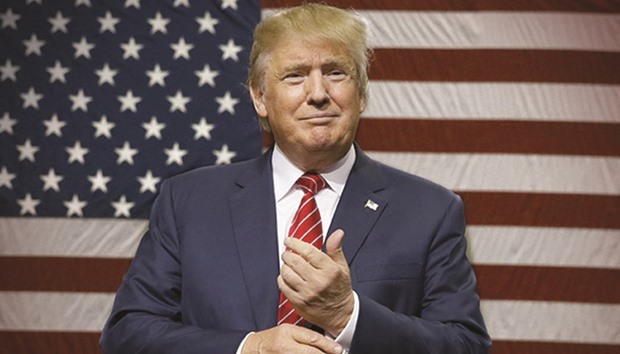President Donald Trump on Monday named Lieutenant General Herbert Raymond McMaster as his new national security adviser, choosing a military officer known for speaking his mind and challenging his superiors.
McMaster is a highly regarded military tactician and strategic thinker, but his selection surprised some observers who wondered how the officer, whose Army career stalled at times for his questioning of authority, would deal with a White House that has not welcomed criticism.
“He is highly respected by everybody in the military and we’re very honored to have him,” Trump told reporters in West Palm Beach where he spent the weekend. “He’s a man of tremendous talent and tremendous experience.”
One subject on which Trump and McMaster could soon differ is Russia.
McMaster shares the consensus view among the US national security establishment that Russia is a threat and an antagonist to the United States, while the man whom McMaster is replacing, retired Lieutenant General Michael Flynn, appeared to view it more as a potential geopolitical partner.
Trump in the past has expressed a willingness to engage with Russia more than his predecessor, Barack Obama.
Flynn was fired as national security adviser on February 13 after reports emerged that he had misled Vice President Mike Pence about speaking to Russia’s ambassador to the United States about US sanctions before Trump’s inauguration.
The ouster, coming so early in Trump’s administration, was another upset for a White House that has been hit by miscues, including the controversial rollout of a travel ban on people from seven Muslim-majority countries, since the Republican president took office on January 20.
The national security adviser is an independent aide to the president and does not require confirmation by the US Senate.
He has broad influence over foreign policy and attends National Security Council meetings along with the heads of the State Department, the Department of Defense and key security agencies.
Republican Senator John McCain, chairman of the Senate Armed Services Committee and a frequent Trump critic, praised McMaster as an “outstanding” choice.
“I give President Trump great credit for this decision,” McCain said in a statement.
A former US ambassador to Russia under Obama, Michael McFaul, a Democrat, praised McMaster on Twitter as “terrific” and said McMaster “will not be afraid to question his boss.”
McMaster, who flew back to the Washington area from Florida with Trump on Air Force One, will remain on active military duty, the White House said.
Trump also said Keith Kellogg, a retired US Army general who has been serving as the acting national security adviser, as chief of staff to the National Security Council.
John Bolton, a former US ambassador to the United Nations, would be asked to serve the administration in another capacity, Trump said.
“He has a good number of ideas that I must tell you I agree very much with,” Trump said of Bolton, who served in Republican President George W Bush’s administration.
Kellogg and Bolton were among those in contention as Trump spent the long Presidents Day weekend considering his options for replacing Flynn.
His first choice, retired Vice Admiral Robert Harward, turned down the job last week.
McMaster, 54, is a West Point graduate known as ‘HR’, with a PhD in US history from the University of North Carolina at Chapel Hill.
He was listed as one of Time magazine’s 100 most influential people in 2014, partly because of his willingness to buck the system.
A combat veteran, he gained renown in the first Gulf War — and was awarded a Silver Star — after he commanded a small troop of the US 2nd Armored Cavalry Regiment that destroyed a much larger Iraqi Republican Guard force in 1991 in a place called 73 Easting, for its map coordinates, in what many consider the biggest tank battle since World War II.
As one fellow officer put it, referring to Trump’s inner circle of aides and speaking on condition of anonymity, the Trump White House “has its own Republican Guard, which may be harder for him to deal with than the Iraqis were.”
The Iraqi Republican Guard was the elite military force of ousted dictator Saddam Hussein.
Trump relies on a tight, insular group of advisers, who at times appear to have competing political agendas.
Senior adviser Steve Bannon has asserted his influence by taking a seat on the National Security Council.
McMaster’s fame grew after his 1997 book “Dereliction of Duty” criticised the country’s military and political leadership for poor leadership during the Vietnam War.
Trump’s pick was praised by one of the president’s strongest backers in the US Congress, Republican Senator Tom Cotton, who called McMaster “one of the finest combat leaders of our generation and also a great strategic mind.”

President Donald Trump
